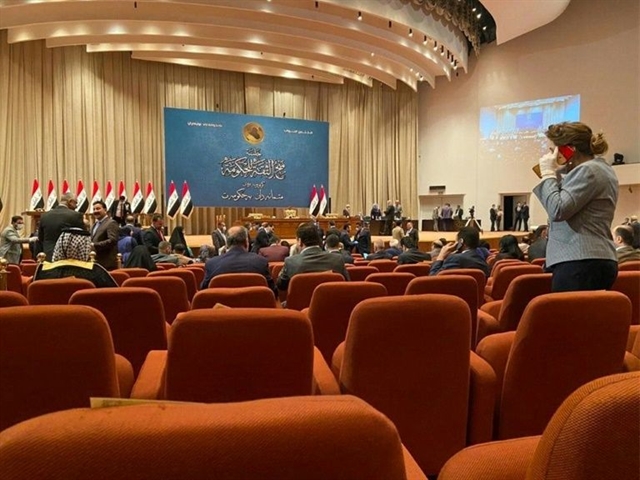 World
World


|
| Iraqi members of parliament vote on a new government led by Prime Minister Mustafa Kadhemi. — AFP/VNA Photo |
BAGHDAD — Iraqi premier Mustafa Kadhemi formally took office early on Thursday after parliament approved his cabinet line-up, taking the reins amid a staggering economic crisis, a health pandemic and the spectre of renewed protests.
Observing social distancing to curb the spread of the coronavirus, lawmakers gathered at parliament in masks and gloves around 9:00pm local time, but the vote was delayed for hours to make last-minute edits to ministerial posts.
MPs approved 15 ministers out of a prospective 22-seat cabinet, with seven ministries -- including the key oil and foreign affairs positions – still empty as political parties squabble over shares.
Kadhemi, the 53-year-old former head of the respected National Intelligence Service (INIS), was nominated by President Barham Saleh on April 9 -- the third attempt to replace outgoing premier Adel Abdel Mahdi.
Abdel Mahdi, 77, resigned late last year following months of protests decrying rampant corruption, unemployment and a political class seen as beholden to neighbouring Iran.
He became the first premier to step down since the 2003 US-led invasion that toppled dictator Saddam Hussein, but stayed on as caretaker PM in the absence of a successor.
Kadhemi's nomination came after weeks of lobbying deeply divided political parties, including those close to neighbouring Iran who had been wary of his ties to the US.
One hardline faction had accused Kadhemi of conspiring with Washington over the January drone strike that killed Iranian general Qasem Soleimani and Iraqi commander Abu Mahdi al-Muhandis outside Baghdad airport.
A partial government
The new PM appeared to have brought Iran-aligned factions on board, with endorsements from both Soleimani's successor as Quds Force chief Ismail Qaani, and from Mohammed Kawtharani, the pointman on Iraqi affairs for powerful Iran-backed Lebanese movement Hezbollah.
Still, negotiations over the cabinet line-up extended until midnight, when 255 of parliament's 329 members entered the hall for the vote.
Among the names passed were sensitive portfolios including the ministers of finance, interior, defence, health, electricity and others -- securing the majority that Kadhemi needed for his cabinet to be considered viable.
The new body is meant to hold early elections seen as an opportunity for a political reset for the country, but it will also face urgent policy priorities.
Iraq's GDP is set to shrink by 9.7 per cent this year and poverty rates may double, making it the country's worst annual performance since 2003, the World Bank has warned.
The enormous deficit brought on by collapsing crude prices may force the cabinet to trim salaries for state workers, potentially sparking new anti-government rallies.
Meanwhile, the coronavirus pandemic has killed more than 100 Iraqis and the country's dilapidated health system is at risk of being overwhelmed by a spike in cases.
In-house trouble
Kadhemi will also have to resolve budget and oil disputes with the semi-autonomous Kurdish region in northern Iraq and lead a strategic dialogue with the United States in June over bilateral economic and military ties.
The new PM has pledged to balance between Iraq's competing allies Washington and Tehran, who have been at loggerheads since the US reimposed tough sanctions on Iran in 2018.
The US has also blamed Iran and its allies for a spate of rocket attacks on American troops in Iraq that have killed US, British and Iraqi forces in recent months.
Just hours before parliament's vote, a new rocket attack -- the first since late March -- hit a military complex outside the Baghdad airport where US troops are based.
Iraq's parliament voted to oust all foreign forces, including some 5,200 US troops, after Soleimani's killing in January -- but the decision has yet to be implemented.
And remnants of the Islamic State group have apparently stepped up attacks in recent weeks, two years after the country declared the jihadists defeated.
In his overnight address to parliament, Kadhemi pledged to hold early elections, draft an emergency budget law.
But Kadhemi's challenges are not just external, said Renad Mansour, a researcher at the London-based Chatham House.
"Kadhemi will try to retain some level of independence from the political blocs as prime minister, but the biggest spoiler could be holdovers from Abdel Mahdi administration who will be wary of him," Mansour said.
"It will be increasingly difficult to do the kind of horse-trading required to reach consensus in Iraq given the level of fragmentation in the political scene," he said. — AFP




